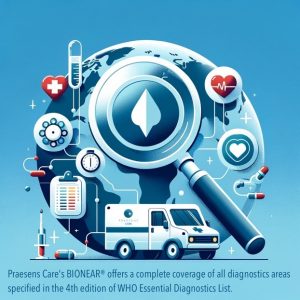In late 2023, the WHO unveiled its 4th Edition of the EDL, reaffirming its dedication to updating this guide with evidence-based choices for in vitro diagnostics (IVD). The latest list includes several new additions and revisions, with three notable highlights:
The EDL4 introduces three tests for Hepatitis E Virus, marking a significant update that includes a rapid diagnostic tool for enhanced diagnosis and surveillance of HEV infections. Given the global prevalence of Hepatitis E and its potentially severe outcomes, these new entries aim to improve outbreak management and assist governments in effectively addressing reported and under-reported cases.
EDL4 has expanded to include personal use glucose monitoring devices, complementing existing medical recommendations for diabetes management. With diabetes being a leading global health concern responsible for 1.5 million deaths annually, the inclusion of personal glucose monitoring devices is set to improve disease management, enabling better outcomes through consistent monitoring.
Reflecting a holistic approach, the EDL4 extends its scope to encompass tests for endocrine disorders, reproductive, maternal, and newborn health, as well as cardiovascular health. Among the new additions are tests for parathyroid hormone, 17-hydroxyprogesterone, Kleihauer-Betke acid-elution, and high-sensitivity troponin I and T, catering to a wide array of health conditions.
Empowering Countries in Diagnostics Planning
The EDL offers a valuable policy framework rather than being prescriptive. It supports countries in improving access to IVDs by providing evidence-based recommendations for their national Essential Diagnostics Lists. Governments can use the EDL to enhance in vitro diagnostics testing services, leading to greater diagnostic access and improved patient outcomes.
Global Collaboration and Support
Aligned with the recent WHA 76.5 resolution on strengthening diagnostics capacity, the release of the EDL4 encourages Member States to develop national diagnostics strategies and essential diagnostics lists based on the WHO model. WHO actively assists countries through webinars, workshops, and direct support, aiding them in creating and implementing EDLs.
Conclusion
The 2023 Essential Diagnostics List marks a significant advancement in global healthcare, providing a roadmap for countries to enhance diagnostic capabilities and improve patient care. By embracing innovation and addressing a variety of health challenges, the EDL reaffirms WHO's dedication to fostering a healthier world through informed, evidence-based diagnostics.
Praesens Care Commitment
Praesens Care continues to leverage this crucial framework to align and expand our BIONEAR service offering, bridging the last mile and enhancing diagnostic access, always tailored to the local health landscape. We are deeply committed to our mission, aiming to:
Through our mobile laboratory, we adeptly navigate challenges even in the most resource-limited settings. Our unwavering dedication to strengthening health systems brings us closer to patients and essential points of need.

For detailed insights into the 2023 WHO EDL decisions, visit the link https://www.who.int/publications/i/item/9789240081093.